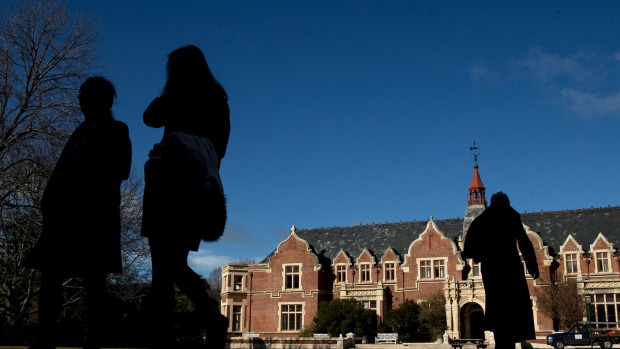Oceanía/Nueva Zelanda/26 de Agosto de 2016/Autora: Emily Murphy/Fuente: Stuff
RESUMEN: Universidad Lincoln tendrá que pensar de forma creativa para reducir costes y aumentar los ingresos, dice un jefe de sector terciario. La universidad especialista en tierra considerará opciones que incluyen la inversión privada y la venta de activos para ayudar a recaudar los millones de dólares que necesita para equilibrar sus cuentas.La Universidad de Canterbury fue un ejemplo. Tenía «una serie de edificios en la periferia del campus», que se alquila a otros negocios, dijo. Encontrando formas creativas para maximizar los «activos de bajo rendimiento» fue una decisión responsable, dijo Whelan. Al otro lado de Nueva Zelanda, las universidades tendrían que encontrar formas de reducir los costos. La Comisión de Enseñanza Superior (TCE) ha estado monitoreando las finanzas de Lincoln. Un asesor financiero independiente ha sido nombrado, y se requiere la universidad para informar a la comisión mensual.No se habían tomado decisiones, pero esperaba que recurrir a consultores para ayudar a implementar los cambios.
Lincoln University will need to think creatively to reduce costs and increase revenue, a tertiary sector boss says.
The specialist land-based university will consider options including private investment and selling off assets to help raise the millions of dollars it needs to balance its books.
Vice-chancellor Robin Pollard said plans to turn around the university’s financial outcomes were needed urgently. «Unpopular» courses would be culled as part of that process.
Universities New Zealand chief executive Chris Whelan said private investment was more common in universities than people thought.
The University of Canterbury was one example. It had «a number of buildings on the periphery of campus» which it rented out to other businesses, he said.
Finding creative ways to maximise «underperforming assets» was a responsible decision, Whelan said. Across New Zealand, universities would have to find ways to reduce costs.
Lincoln was no exception, although there was «perhaps a slightly different level of urgency», he said.
The Tertiary Education Commission (TEC) has been monitoring Lincoln’s finances. An independent financial advisor has been appointed, and the university is required to report back to the commission monthly.
There was an expectation it would «return to and sustain a reasonable surplus over time», a TEC spokeswoman said.
Pollard estimated $7 million dollars would need to be found. The university made a $6m loss last year, excluding insurance proceeds.
Lincoln had a «high value of assets on its balance sheet», Pollard said, including «thousands» of hectares of farmland.
It owned and managed 19 farms in total. Among the largest was Mt Grand – a 2127 hectare high country station in Central Otago.
Pollard had asked for farms to be categorised according to their purpose, so the university could best understand how to «utilise the money tied up in them».
Options included selling or leasing them, he said.
No decisions had been made, but he hoped to bring in consultants to help implement changes.
Ngai Tahu has the right of first refusal on any Government land being sold, however if it went to open market it could be «well received», Colliers International director Shane O’Brien said.
The farms around Lincoln had «good soils», and their position close to the city would be «keenly sought after».
The lower dairy payout meant there were fewer buyers in the market, «but there’s still a number», he said.
Tertiary Education Union branch president Stuart Larsen worried urgent changes would put «added pressure» on staff, who were already dealing with high workloads.
Most staff wanted Lincoln to succeed, he said. Giving students the «best experience» was a common goal.
More direction was needed so staff knew exactly what they were consulting on.
Larsen said spending on consultants should be kept to a minimum.
The university has been criticised over its consultancy budget during former vice-chancellor Andrew West’s tenure.
Between 2013 to 2015 the university employed and paid $410,754 to hire consultant Roger Pikia, who had previously been found by the High Court to have committed a «fraudulent breach of trust» in claiming his own grandmother’s land.
Tertiary Education, Skills and Employment Minister Steven Joyce said as each university operated autonomously it was «primarily Lincoln’s responsibility to return to financial sustainability».
«However, the Government is providing additional funding support to the university and the TEC is supplying financial and governance expertise to assist the university to develop a strategy for long-term sustainability.»
Joyce said the Government had committed more than $100m to help replace earthquake-damaged buildings and tuition subsidies for agriculture courses had increased by about 50 per cent over the last three budgets.
During question time in the house on Thursday, Associate Minister for Tertiary Education, Skills and Employment Louise Upston said Lincoln had struggled «since before 2007, because of its small size».
Overall, Lincoln University had received a 65.3 per cent increase in funding since 2008, compared to 24.2 per cent for the university sector overall.
Fuente: http://www.stuff.co.nz/national/education/83564356/universities-new-zealand-lincoln-will-need-to-show-creative-thinking







 Users Today : 302
Users Today : 302 Total Users : 35459897
Total Users : 35459897 Views Today : 482
Views Today : 482 Total views : 3418454
Total views : 3418454